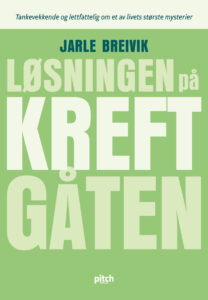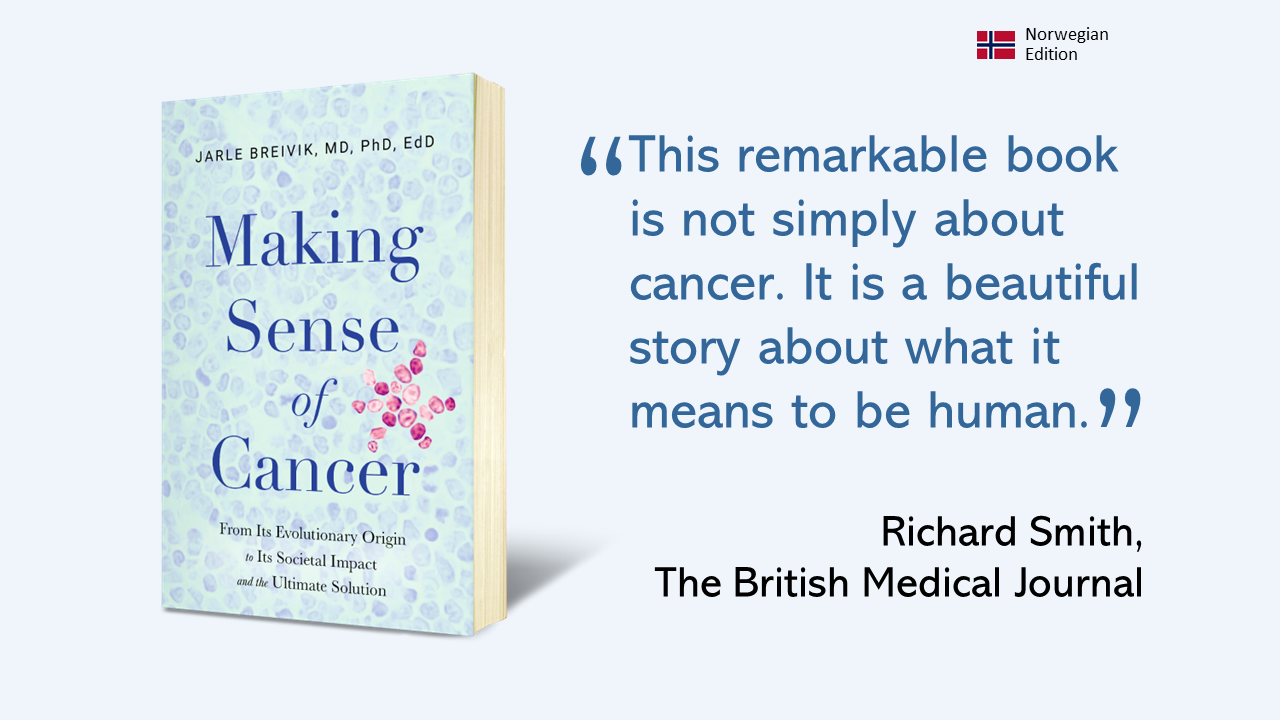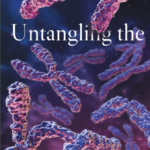THE AUTHOR

Jarle Breivik (MD, PhD, EdD) is a professor of medicine and Head of the Department of Behavioural Medicine at the University of Oslo. He completed his PhD at The Norwegian Radium Hospital, where he focused on immunotherapy and the evolutionary dynamics of cancer. A former Fulbright scholar, Breivik also holds a doctorate in education from the University of Pennsylvania. Internationally recognized for his innovative ideas on cancer, his thought-provoking analyses—published in PNAS, EMBO Reports, Wired, and The New York Times have sparked profound debate. In his critically acclaimed book, Making Sense of Cancer, Breivik brings together his groundbreaking insights in a captivating story about humanity.
THE BOOK
Publisher: River Grove Books
ISBN: 978-1-63299-761-6 (Paperback)
ISBN: 978-1-63299-762-3 (eBook)
Making Sense of Cancer
By Jarle Breivik
Chapter 1: The Purpose
Nothing in biology makes sense except in the light of evolution, but how do we make sense of cancer?
Chapter 2: The Background
A New Oil: A neighbor highlights the gap between the promises of cancer research and the growing cancer epidemic.
A Failed Moon Landing: Obama and Biden’s personal tragedies and their ambitions to conquer cancer “once and for all.”
A Rude Provocation: An op-ed in The New York Times challenges the scientific and political narrative of cancer research.
A Big White Lie: Lance Armstrong realizes that a world without cancer might be an illusion.
An Enemy of the People: The author faces a backlash for challenging the establishment with scientific realities.
Chapter 3: The Enemy
Malevolent Crabs: Cancerous tumors may seem like dreadful monsters, but it is time to face the enemy.
Multidimensional Warfare: The war on cancer casts researchers as heroes and patients as battlefields in a story about good versus evil.
The Difficult Peace: Cancer is not evil. We need a new narrative that fosters understanding rather than fear and alienation.
Chapter 4: The Problem
A Biotechnological Conundrum: Cancer may be seen as a technological problem involving faulty cells that need to be repaired or eliminated.
A Challenge to Society: Cancer is also a societal problem involving complex issues of economy, ethics, and equality.
A Personal Journey: Behind every cancer diagnosis lies a personal story, and empathy may be the most powerful medicine.
An Alternative Reality: Many see cancer through a metaphysical lens colored by pseudoscience and superstition.
An Elephant: The challenge is integrating the different perspectives to build a multidimensional model of understanding.
Chapter 5: The Cause
Smoke without Fire: 250 years ago, Percivall Pott discovered that smoke promotes cancer, and the tobacco industry still doesn’t care.
Cancer from Living: We get cancer from everything, from viruses and hormones to sunlight and sugar, but most of all, we get cancer from living.
Fading Flowers: The human body is a beautiful flower that gives life to a new generation before it withers and dies.
Chapter 6: The Principle
Darwin’s Idea: The theory of evolution has been widely misused and misunderstood by both its proponents and opponents.
The Building Blocks of Life: The origin of cancer—and life—lies in the evolution of self-replicating molecules.
Selfish Genes: They are not our genes. We are their disposable vehicle of transportation to the next generation.
In the Light of Evolution: To understand cancer, we must disregard our egocentric worldview and follow the logic of the replicators.
Chapter 7: The Evolution
Genetic Crossroads: While one copy of the genome follows the germinal highway, another constructs our multicellular body.
Evolution Within: Natural selection within our body explains how the immune system learns and remembers.
The Final Countdown: Every cell division yields thousands of mutations, while the telomeres are counting down for cellular suicide.
Evolution of Cancer: The guardian of the genome is kicked out, and the immortal renegades take hold of the organism.
Chapter 8: The Synthesis
Epigenes: The epigenetic code determines how the genes perform their theatrical roles on different stages.
Memes: If our body is made by genes, and our soul is made by memes, then who are we?
Darwin’s Theory of Information: The concept of information unites biology and culture, providing an integrated understanding of life—and cancer.
Information in Concert: A meme originating in the Norwegian mountains changes the genes of an unborn child in Australia.
Levels of Understanding: As we climb the ladder of understanding, cancer transforms from a mysterious foe to a logical consequence of evolution.
Chapter 9: The Solution
False Solutions: Myths, exaggeration, and conspiracy theories obstruct more meaningful conversations about cancer research.
Nature’s Solutions: The Greenland shark lives for centuries, and trees can live for millennia, so why don’t we?
Immunological Warfare: Activating the immune system can kill cancer, but the longer we live, the more cancer we get.
The Immortal Body: We may be able to rejuvenate all our cells and organs, but it’s not really the body we care about.
The Immortal Soul: The ultimate cure for cancer is to free our minds from our mortal bodies—but will we still be human?
PRAISES AND REVIEWS
MEDIA
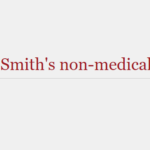
Why I Hope to Die of Cancer
Richard Smith, Jarle Breivik
Richard Smith's non-medical blogs
Jul. 1, 2023
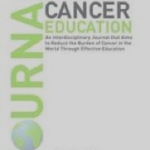
The Nine Cancer Frames
Craig Murray, Nina von Possel, Hanne C Lie, Jarle Breivik
Journal of Cancer Education
Jul. 19, 2021
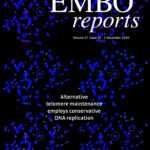
Reframing the
“Cancer Moonshot”
Jarle Breivik
EMBO Reports
Dec. 1, 2016

We Won’t Cure Cancer
Jarle Breivik
The New York Times
May 27, 2016
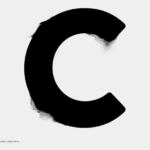
The Way We Think about
Cancer Must Evolve
Mark Wolverton
WIRED
May 22, 2013
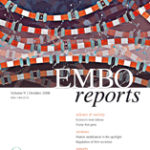
Frame that Gene
Rebecca Carver, Ragnar Waldahl, Jarle Breivik
EMBO Reports
Oct. 1, 2008
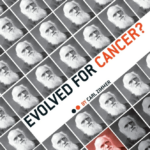
Evolved for Cancer
Carl Zimmer
Scientific American
Jul. 1, 2008

No Solution to Cancer
Science Daily
Apr. 17, 2007
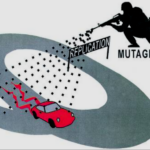
Have Our Genes Evolved
to Turn Against Us?
Medical Press
Apr 16, 2007
CONTACT
For feedback, public speaking, media, and book events please contact:
mail@jarlebreivik.com
For research and academic matters see:
https://www.med.uio.no/imb/english/people/aca/jbreivik/index.html
The Norwegian Edition
